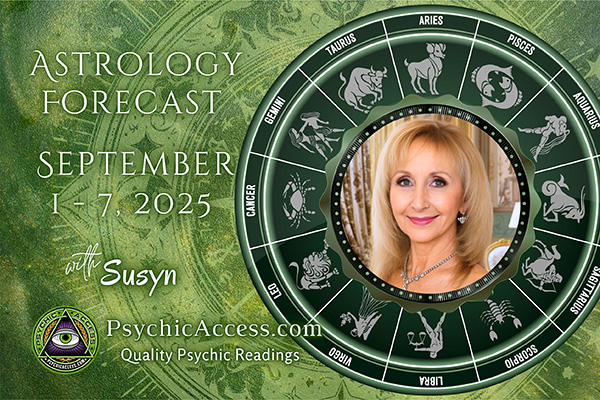September 1 – 7, 2025 Astrological Outlook: Anticipations
 The week opens with a robust, stabilizing energy as Saturn transitions into Pisces. This change resembles unlocking a door that reveals your deeper intentions.
The week opens with a robust, stabilizing energy as Saturn transitions into Pisces. This change resembles unlocking a door that reveals your deeper intentions.
Saturn embodies lessons, structure, and resilience. In Pisces, it softens its conventional harshness, encouraging you to root your aspirations, your empathy, and your instincts. It invites you to cultivate spiritual discipline, develop routines that nurture your spirit, and establish boundaries that are both tender and strong.
Envision this as the groundwork of your inner being taking shape. If you’ve been feeling disoriented, inundated, or adrift, this is your cue to pause, inhale, and start constructing a solid base for the emotional or creative aims that are most important to you.
By midday*, the Moon creates a supportive connection. The Moon in Sagittarius forms a trine with Chiron in Aries.
This aspect fosters healing through honest self-expression, especially if you’ve been hesitating to voice your needs or vulnerabilities. The Moon in Sagittarius encourages you to broaden your narrative and to share your healing journey with assurance.
Chiron in Aries serves as a reminder that your wounds can lead the way to your bravery. If there is anyone you’ve yearned to contact or any aspect of yourself that needs gentle care today, now is a splendid time to initiate.
Later this evening, the Moon shifts into Capricorn, positioning you into a mindset centered on stability, accountability, and practical advancement. A Capricorn Moon urges you to monitor your resources, your daily habits, and your long-term aspirations. It’s not about forcefully pushing forward but rather structuring a realistic pathway ahead with tangible steps.
As it aligns with the US Labor Day vibe, today’s energies resonate with a collective desire for relaxation and rejuvenation. Work is significant, but so is honoring your physical and emotional well-being. Let today be a period to recognize the worth of grounded intention, gentle healing, and meticulous planning.
Tuesday, September 2: Clarity In Communication
Tuesday begins with a moment of delicate tension as Mercury in the last degree of Leo engages in a quincunx with Saturn in the last degree of Pisces. This aspect can introduce awkwardness in communication or strategy. You may feel inclined to express boldly and directly, but find yourself doubting your tone or encountering emotional barriers from others. It’s akin to trying to connect two puzzle pieces that nearly fit but require slight adjustments.
Later in the morning, Mercury moves into Virgo, one of its ruling signs. This transition brings immediate mental focus and clarity. In Virgo, Mercury flourishes. It assists you in organizing your thoughts, honing your routines, and articulating yourself with careful precision. If you’ve felt mentally scattered or emotionally unbalanced, this transit aids in recalibrating your mindset.
From this juncture on, anticipate communication becoming more grounded, planning feeling more natural, and details taking precedence. You might find yourself refining messages, streamlining tasks, or tackling issues with calm reasoning and quiet confidence.
By midday, your mindset is sharper than before. You could reorganize your schedule, compose a carefully crafted message, or adjust plans to feel both accurate and soulful.
Wednesday, September 3: Intensity & Insight
Wednesday unfolds with nearly constant lunar activity, making it an erratic day of emotional and energetic movement.
In the early hours, the Moon in Capricorn squares Mars in Libra. This creates feelings of frustration or restlessness regarding ambition and partnership. You might feel tugged between adhering to structure and fostering harmony with others. A square represents a challenge to navigate forward by balancing these conflicting energies.
Shortly afterward, the Capricorn Moon forms a quintile with Saturn in Pisces, an imaginative connection that encourages you to generate practical solutions from your intuitive insights. There’s a creative problem-solving quality here. Structure doesn’t have to be rigid; it can be inspired by empathy and inner understanding.
Minutes later, the Moon sextiles Lilith in Scorpio. This subtle advantage allows access to suppressed strength, deep intuition, or concealed aspects of your emotional self. You may discover hidden emotions or witness your own power in vulnerability.
By mid-morning, the Moon opposes Jupiter in Cancer. Part of you might want to expand, nurture, and enjoy, while another part recognizes that the day necessitates discipline and boundaries. Jupiter in Cancer urges you toward emotional nurture and belonging. The opposition highlights the need to deeply care and follow through with your obligations.
Shortly after, the Moon sextiles the North Node in Pisces, reinforcing the notion of aligning your emotional actions with your spiritual journey or life purpose. There’s potential for deep alignment. What you emotionally engage with supports the larger narrative your soul is guiding you toward.
Midday brings another quintile, now between the Moon and Neptune in early Aries. You may tap into creative vision, imaginative sparkle, or a soft empathy that inspires you to dream of a more compassionate future. It’s a gentle reminder that structure and inspiration can coexist harmoniously.
By mid-afternoon, Jupiter in Cancer trines the North Node in Pisces, providing a nurturing push to your emotional growth and intuition. In the long run, you’re being gently ushered toward emotional maturity that is rooted in spiritual service and soulful connections.
The day is rich with lunar shifts, emotional depth, creative tension, and transformative guidance. It calls for you to witness your inner intensity, harmonize ambition with heart, and let imagination enhance your responsibilities.
Thursday, September 4: Innovative Connections
Early Thursday, the Moon transitions into Aquarius. Themes of freedom, innovation, collective consciousness, and mind-expanding connections come into play. The Aquarius Moon lightens the earlier Capricorn constraints and encourages you to ponder questions such as how to remain authentic within a group or how to contribute to humanity with your unique brilliance.
This day invites you to step back from the to-do list and reflect on how your vision aligns with a larger vision. If someone, a group, or a cause draws your interest, reach out, exchange ideas, or engage in collaborative brainstorming. Friendships, communities, and new perspectives will flourish now.
Friday, September 5: Rebel Within
Friday brings a subtle but powerful transition as Uranus enters retrograde. Uranus, the planet of rebellion, innovation, breakthroughs, and sudden insights, often impels us to awaken. In retrograde, its flashes of insight turn inwards.
Over the next five months, this retrograde phase invites you to thoughtfully reconsider which freedoms, technologies, or rebellious aspects of self need revisiting. Ideas or impulses that surfaced weeks or months ago may resurface now with newfound clarity. You may find that unconvention can be fruitful, but often requires inward integration first.
In other words, today marks a period of inner realignment with your independent, visionary, or unconventional impulses. Reflect, refine, and allow your spirit of innovation to evolve underneath the surface. It’s not about grand external changes today, yet seeds are being sown for breakthroughs to emerge in the ensuing months.
Saturday, September 6: Subtle Emotional Currents
Shortly after midnight, Uranus begins its retrograde journey in earnest. However, the Moon won’t shift until nearly noon. In the morning hours, you may still feel the energy of Uranus retrograde surfacing. Unusual thoughts, inner restlessness, intuitive downloads, or even sudden feelings about your long-term direction may come up.
When the Moon enters Pisces mid-morning, emotional boundaries may soften in beautiful ways. You are likely to feel more sensitive, dreamy, and open. This energy amplifies creativity, compassion, and spiritual receptivity. It’s an ideal time for meditation, music, bath rituals, or any activity that draws upon feeling.
Connect with what resonates with your heart more than your intellect. The Moon in Pisces encourages you to release, to soften, and to deeply experience your inner reality. Boundaries may become less defined, and that’s perfectly fine. A gentle presence can be just as potent as focused action.
Sunday, September 7: Illuminated Closure
Sunday marks the week’s peak moment, a Full Moon in Pisces that coincides with a lunar eclipse. Traditionally known as the Corn Moon, this signifies harvest time for corn, a staple for many Indigenous cultures.
This is the first of two eclipses this month and begins an impactful six-month cycle. Full Moons represent culmination, clarity, endings, and emotional release. With an eclipse, the energy deepens. What comes to the surface now is often profound and can signify significant turning points.
Under the Pisces Full Moon, emotional sensitivity, compassion, intuition, and spiritual beginnings or endings are amplified. You may feel compelled to release outdated patterns, beliefs, or relationships that no longer support your compassionate journey. Tears, inspiration, and clarity might arise in unexpected forms.
Since Pisces governs dreams, mysticism, the unconscious, surrender, and letting go, this eclipse casts light on what must be acknowledged or released at a soulful level. It may feel akin to a dream dissipating, creating space for new meaningful experiences that often blossom in the ensuing half year.
Eclipses are treasures wrapped in cosmic wonder. What comes into focus may be untidy. Trust the emotional clarity that surfaces, even if it unfolds gradually, and allow yourself to embrace the new cycle with openness and grace.
* All aspect and transit times are in Eastern Time (New York City, NY, USA). Please adjust accordingly for your local time zone.
|
Susyn resides in New Mexico, offering Psychic Guidance, Astrological Insights, and Channeled Messages that transform lives! She is highly credentialed, holding a doctorate in metaphysical studies and certifications from The American Association of Professional Psychics and The American Tarot Guild. Additionally, she’s a published author of two metaphysical works and has written numerous articles and horoscope columns. Besides her readings, Susyn serves as a mentoring practitioner, teaching others to harness their gifts, elevate their vibrations, and empower themselves. A sought-after guest on various radio shows, she has also hosted her own. If you’re looking for an exceptional reader with remarkable accuracy, you can find Susyn at PsychicAccess.com. |
As we embark on the first week of September 2025, the universe is alive with energy and anticipation. The celestial alignments are poised to usher in noteworthy changes and growth opportunities in diverse areas of our lives. Let’s delve into what the stars have planned for us from September 1st to 7th, 2025.
On September 1st, Mercury, the planet of communication and intellect, creates a harmonious trine with Uranus, the planet of innovation and transformation. This configuration will lead to sudden insights and breakthroughs in our thinking, enabling us to view situations from a refreshed perspective. It’s an excellent moment for brainstorming novel ideas and thinking creatively.
Meanwhile, on September 2nd, Venus, the planet of love and beauty, will find itself in a square with Saturn. This could introduce challenges in our relationships, as we may experience limitations in expressing our affections. Open and honest communication with our loved ones is crucial during this time to avoid potential misunderstandings.
As we approach the weekend, Mars, the planet of action and ambition, will form a conjunction with Jupiter on September 4th. This dynamic alignment will provide a surge of energy and confidence in pursuing our goals. It’s an opportune time to take bold risks and chase after our desires with determination.
On September 5th, the Sun will align in a trine with Pluto, the planet of transformation and renewal. This connection will foster deep insights and revelations, allowing us to release old habits and embrace fresh beginnings. It’s a period for personal development and empowerment, shedding light on our deepest desires and motivations.
Finally, on September 7th, the Full Moon in Pisces will light up the night sky, enhancing our intuition and emotional awareness. This time calls for connecting with our inner selves and tuning in to our instincts as we navigate any challenges or uncertainties that may manifest.
Overall, the first week of September 2025 holds the promise of a dynamic and transformative time, brimming with opportunities for growth and self-discovery. By remaining receptive to the cosmic energies at play and welcoming the changes that arise, we can seize this astrologically potent moment and lay the groundwork for a bright and promising future. Continue reading














